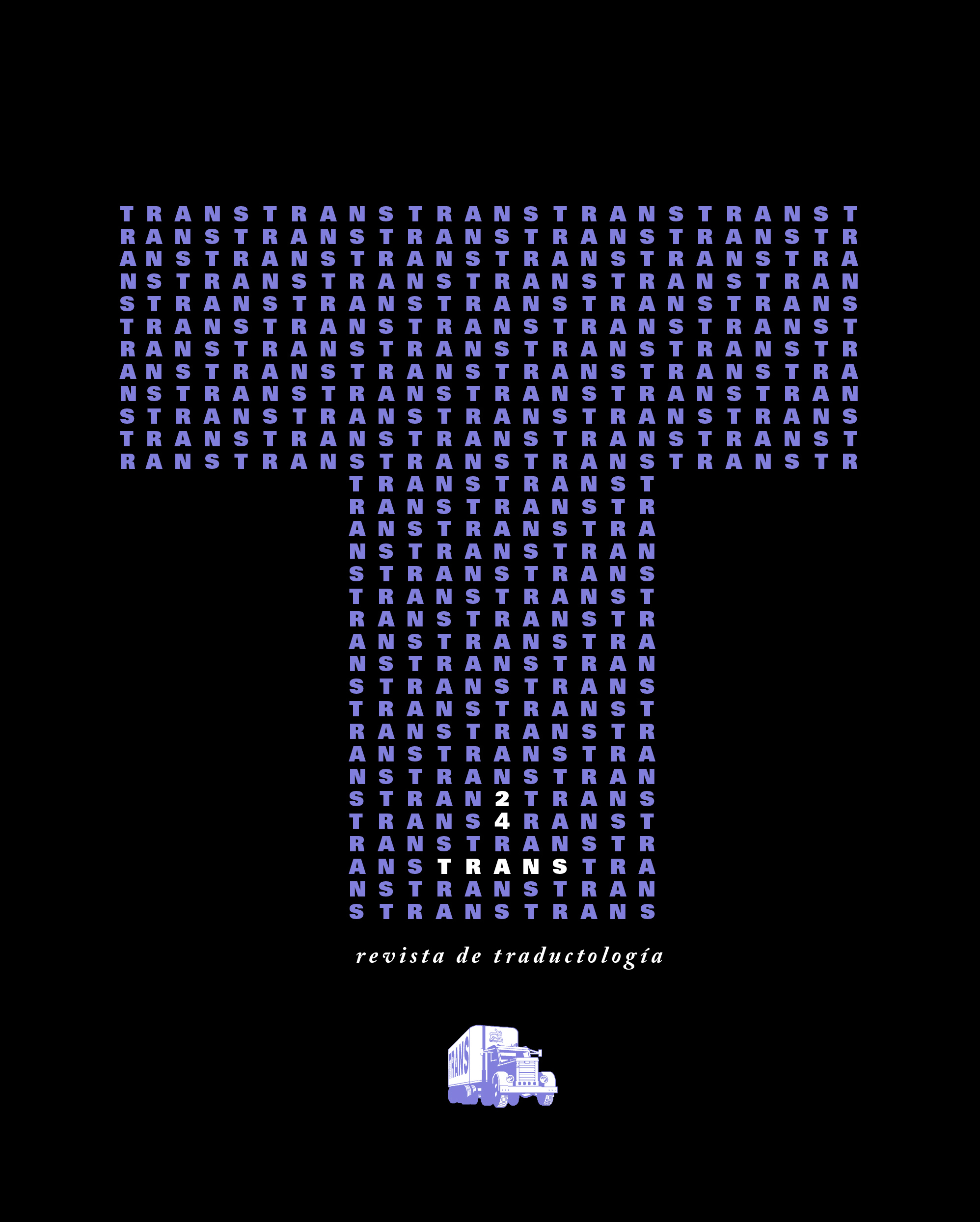Entre la extrañeza y las equivalencias naturales: traducir la poesía experimental de Lorine Niedecker
DOI:
https://doi.org/10.24310/TRANS.2020.v0i24.8028Keywords:
poetry translation, experimental poetry, strangeness, literal approach, translation techniques.Abstract
This paper shows how my translations of objectivist American poet Lorine Niedecker for the bilingual volume Y el lugar era agua: Antología poética, published in 2018, have constantly sought for natural Spanish equivalences in sound and rhythm while trying, through different translating and rhetorical techniques, to keep the tone of strangeness that a more literal approach to the translation (after Walter Benjamin’s reflections on the translation of experimental poetry) would render. To this end, specific translation uses (punctuation sings such as the long dash and other visual display elements, paraphrasing and amplification, homophony, alliteration, and techniques for the reproduction of a sustained tone in the target text) will be explained with respect to the translation choices for some of the most successful poems of the author.
Downloads
Metrics
Publication Facts
Reviewer profiles N/A
Author statements
Indexed in
-
—
- Academic society
- N/A
- Publisher
- Universidad de Málaga
References
Armantrout, Rae (2007): «Darkinfested», in Collected Prose. San Diego: Singing Horse Press, 63-72.
Armantrout, Rae (2007): «Feminist Poetics and the Meaning of Clarity», in Collected Prose. San Diego: Singing Horse Press, 38-48.
Augustine, Jane (1982): «The Evolution of Matter: Lorine Niedecker’s Aesthetic», Sagetrieb, 1, 277-284.
Augustine, Jane (1996): «What’s Wrong with Marriage: Lorine Niedecker’s Struggle with Gender Roles», in Jenny Penberthy (ed.) Lorine Niedecker: Woman and Poet. Orono, Maine: National Poetry Foundation, 139-156.
Benjamin, Walter (1997): «The Translator’s Task», TTR, 10:2, 151-165.
Blau Duplessis, Rachel (1996): «Lorine Niedecker, the Anonymous: Gender, Class, Genre and Resistances», in Jenny Penberthy (ed.) Lorine Niedecker: Woman and Poet. Orono, Maine: National Poetry Foundation, 113-137.
Carbajosa , Natalia (2016): «Las Brontë tenían sus páramos, yo tengo mis marjales: La poesía en el agua de Lorine Niedecker», Jotdown, <https://www.jotdown.es/2016/02/las-bronte-tenian-sus-paramos-yo-tengo-mis-marjales-la-poesia-en-el-agua-de-lorine-niedecker/>.
Crase, Douglas (2013): «Niedecker and the Evolutionary Sublime», in Lorine Niedecker: Lake Superior, Seattle, Wave Books, 28-48.
DekovEn, Marianne (1989): «Male Signature, Female Aesthetic: The Gender Politics of Experimental Writing», in Ellen G. Friedman & Miriam Fuchs (eds.), Breaking the Sequence: Women’s Experimental Fiction, Princeton, Princeton University Press, 72-81.
Lemardeley Marie-Christine (2007): «Poetry, Poverty, Property: Lorine Niedecker’s Quiet Revelations», EREA, 5:1, 7-13.
Middleton, Peter (1997): «Lorine Niedecker’s ‘Folk-base’ and Her Challenge to American Avant-Garde», Journal of American Studies, 31:2, 203-18.
Monstruos en su laberinto: Poesía y traducción (2006): Carlos Jiménez arribas , «Traducción y contemporaneidad: La lengua en acto»; Jordi Doce: «Traducir: Teoría»; Miguel Casado: «La experiencia de lo extranjero» <http://www.dvdediciones.com
/monstruos_poesiaytraduccion.html>.
Niedecker, Lorine (2018): Y el lugar era agua: Antología poética, tr. Natalia Carbajosa, León: Ediciones Eolas.
Penberthy, Jenny (1993): Niedecker and the Correspondence with Zukofsky 1931-1970. Cambridge: Cambridge University Press.
Penberthy, Jenny (2002): Lorine Niedecker: Collected Works, Stanford: University of California Press.
Downloads
Published
How to Cite
Issue
Section
License
Copyright (c) 2020 TRANS – Revista de Traductología

This work is licensed under a Creative Commons Attribution-NonCommercial-ShareAlike 4.0 International License.
All contents published in TRANS. Revista de Traductología are protected under the Creative Commons Attribution-NonCommercial-ShareAlike 4.0 International (CC BY-NC-SA 4.0) license. All about this license is available in the following link: <http://creativecommons.org/licenses/by-nc-sa/4.0>
Users can copy, use, redistribute, share and exhibit publicly as long as:
- The original source and authorship of the material are cited (Journal, Publisher and URL of the work).
- It is not used for comercial purposes.
- The existence of the license and its especifications are mentioned.
- ShareAlike — If you remix, transform, or build upon the material, you must distribute your contributions under the same license as the original.
There are two sets of authors’ rights: moral and property rights. Moral rights are perpetual prerogatives, unrenounceable, not-transferable, unalienable, imprescriptible and inembargable. According to authors’ rights legislation, TRANS. Revista de Traductología recognizes and respects authors moral rights, as well as the ownership of property rights, which will be transferred to University of Malaga in open access.
The property rights are referred to the benefits that are gained by the use or the dissemination of works. TRANS. Revista de Traductología is published in an open access form and it is exclusively licenced by any means for doing or authorising distribution, dissemination, reproduction, , adaptation, translation or arrangement of works.
Authors are responsable for obtaining the necessary permission to use copyrighted images.













21.png)
